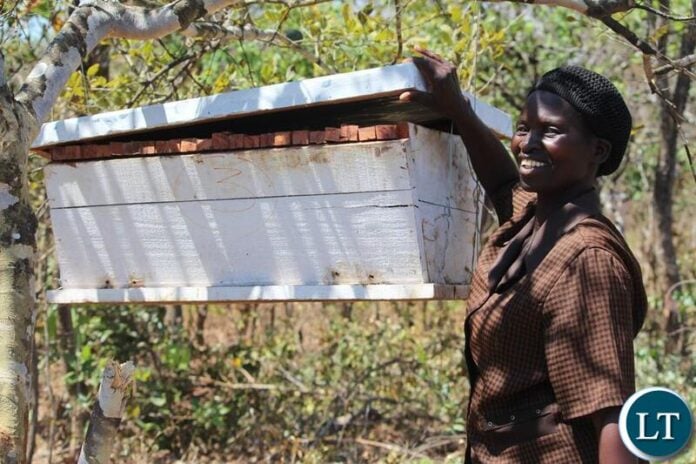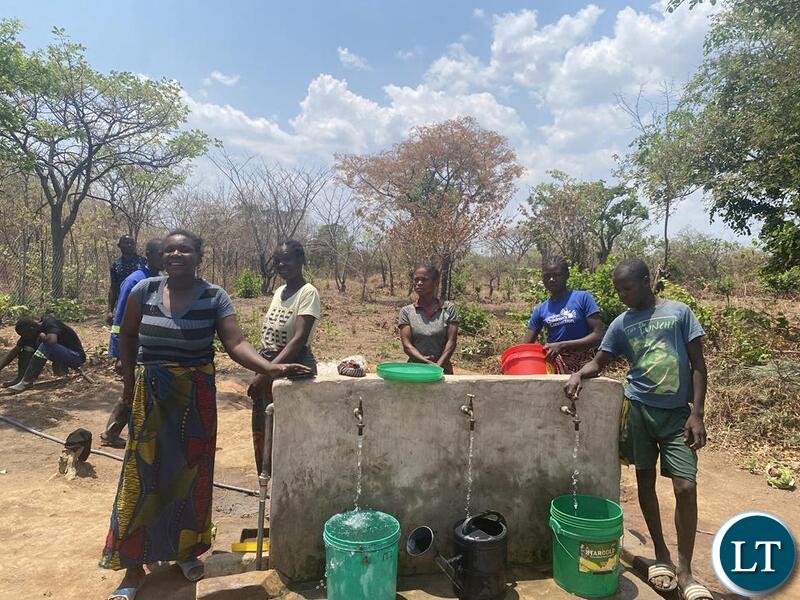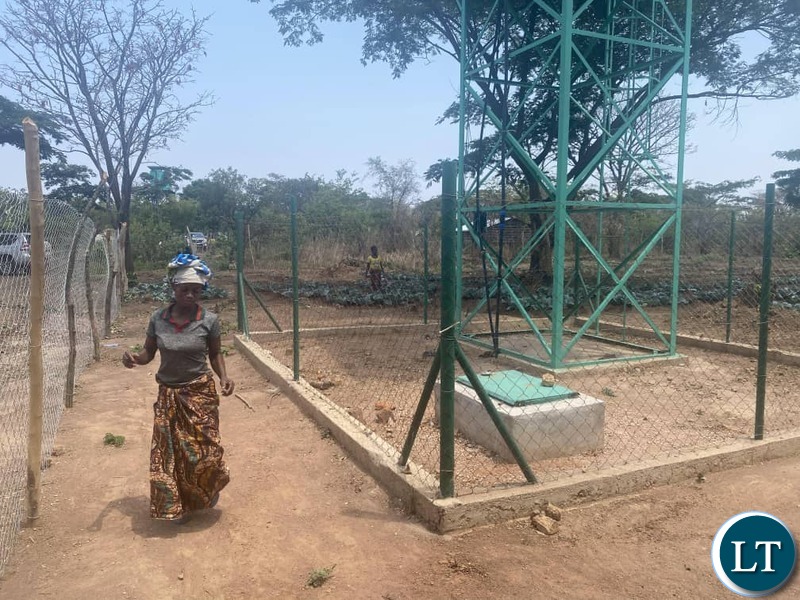
…Against all odds, the Mbala-based women are at the forefront of fighting climate change through beekeeping
By SIMON MUNTEMBA
In the remote village of Kalambo, under Chief Zombe of Mbala District in Northern Province, Zambia, where erratic weather patterns are limiting livelihood options for vulnerable communities and exacerbating poverty levels, the women have taken up beekeeping to diversify incomes and fight climate change.
Erratic weather conditions induced by the El Niño phenomenon have continued hitting Zambia’s rain-fed areas, posing serious threats to the livelihoods of millions of smallholder farmers, including women and girls who are disproportionately affected.
As subsistence farmers who relied on rain-fed agriculture for years, life became hard for the women in Kalambo Village when crop yields and production reduced drastically because the skies, once generous with rain, had become stingy, leaving their fields parched and barren.
Tired of living in abject poverty at household and community levels, the women took the challenge into their own hands by venturing into the male-dominated beekeeping sector.
In May 2021, 25 women and girls in the village, which is about 170 kilometers from Kasama, the Provincial Headquarters, formed Mushili Women’s Club with the sole purpose of finding solutions to challenges stemming from climate change impacts and bailing themselves out of the bondage of extreme poverty.
“Frustrated by always bearing the burden of erratic weather patterns, we decided to do something to solve our unending problems. We unanimously agreed to form a club (Mushili Women’s Club) in 2021,” says club chairperson Catherine Nanyangwe.
The club nestled 100 beehives in locations that conserve critical wildlife habitats.
This initiative has been made possible because of the technical and financial support from the Zambian Government through the World Bank-funded Transforming Landscapes for Resilience and Development (TRALARD) project.
The TRALARD Project, implemented by the Ministry of Green Economy and Environment, seeks to improve natural resource management and support vulnerable communities to better adapt to climatic risks prevalent in selected districts of the northern region of Zambia, namely Luapula, Northern, and Muchinga Provinces.
Ms. Nanyangwe stated that the club received K803,659 (about US$32,000) as start-up capital in October 2022 from the TRALARD project to venture into their proposed beekeeping project, as well as goat rearing and gardening.
To ensure sustainability of the investment, she said all club members were trained in modern beekeeping, including honey collection, processing, and value addition techniques, as well as in conservation farming.
“In addition, we used part of the funds received to drill the first-ever solar-powered borehole with the installation of a water reservoir tank to support our gardening activities. Besides, it is also a source of clean and safe drinking water for the entire community, and cases of diarrheal diseases have drastically reduced in the village. As a club, we are now growing a variety of vegetables throughout the year using animal manure, which means generating surplus income and increased profits,” Ms. Nanyangwe said with a smile as she pointed at the solar-powered borehole.
These activities have offered women some source of income to strengthen food security and improve their livelihoods, a stark contrast from the past when they had no sustainable economic activities to support their families.
In the recent past, members of Mushili Women’s Club, like other women across the region, suffered an outsized burden of climate change, largely due to gender inequalities.

water for the entire community. Photo by Simon Muntemba
IMPACT OF CLIMATE CHANGE ON WOMEN AND GIRLS
According to a report on the Regional Gender Action Plan for Eastern and Southern Africa (2024-2028) by the World Bank Group, the majority of women across Southern Africa face unequal economic opportunities and an inequitable burden of the socio-economic consequences of poverty.
Despite being actively engaged in agricultural activities, women in the region have less access than men to credit, land rights, extension services, and generally face disenfranchisement within the community, impairing their productivity and most likely constraining their capacity to adapt to climate change.
In many parts of the world, women hold traditional roles as primary caregivers in families and communities, and as the main providers of food and fuel, they are more vulnerable when flooding and drought occur. The United Nations estimates that 80 percent of those displaced by climate change are women.
During droughts, traditional gender roles cause girls to suffer disproportionate education disruptions, creating higher risks of child marriage. For instance, girls are compelled to walk long distances to fetch water at the expense of studying.
Due to increased deforestation, women are equally forced to cover longer distances in search of firewood.
Mushili Women’s Club member Judith Nakazwe, 18, narrated that she and other girls in the village walked long distances to fetch water at the expense of studying during their junior secondary school time.
“Unfortunately, when the final grade 9 examination results were announced, my results were bad. I am even ashamed to tell you that I failed lamentably. And because my uncle who was sponsoring me died that same year, out of frustration, I dropped out of school in grade 9. I couldn’t make it to grade 10. Along the way, I got married, and the rest is history,” said Nakazwe, a young mother of one.
Nakazwe’s experience mirrors what is happening across the region where gender inequalities, fueled by societal norms and defined gender roles, affect not only females’ exposure to hazards but also limit their resilience and adaptive capabilities.
Like in many parts of the world, women in the region bear the greatest burden of the erratic changes in weather patterns, as they are the mainstay of agricultural production.
“In the province, poverty is high and economic opportunities for women, in particular, are severely limited. This is why my Government, in collaboration with the World Bank, has prioritized financial and technical support to women’s groups to enable them to engage in diversified livelihoods and improved farming practices,” says Northern Province Deputy Permanent Secretary, Lewis Mwape.
Meanwhile, District TRALARD Project Operations Officer Chiindi Chiputa disclosed that over K34 million had been disbursed as grants for livelihood activities to 46 groups, including Mushili Women’s Club in Mbala.
It is heartwarming that with such grants, members of Mushili Women’s Club are determined not to be beaten by the impact of climate change but to be at the forefront of efforts exploring alternative avenues.
As extreme weather conditions creep up, the fight to stop climate change is truly a matter of life and death for them. They have waged a spirited fight against persistent climate change through beekeeping.

support their gardening activities throughout the year. Photo by Simon Muntemba
BEEKEEPING OFFERS REAL PRACTICAL SOLUTIONS
Beekeeping is a promising income-generating activity for many rural households, as it directly and indirectly contributes to the income of households and the economy of the nation.
“Our lives have been transformed ever since we started the beekeeping business. In our first harvest, we made K30,700 (US$1,180) profit. Beekeeping has improved food security and the nutritional status of our families. Unlike in the past, we are now able to have decent meals and support our families,” testifies a visibly happy Mushili Women’s Club secretary, Mervis Chanda.
In addition, beekeeping, according to the Global Journal of Melittology published in 2019 by the University of Kansas, is an important practice that can help people adapt to and lessen the effects of climate change.
In forested areas that are experiencing the impacts of climate change, it is possible to diversify from agricultural-based livelihoods to others, such as beekeeping, that allow farmers to continue generating income while maintaining the resilience of the environment and reducing greenhouse gas (GHG) emissions.
By incorporating beekeeping into their agricultural systems, farmers have the potential to create more resilient ecosystems while simultaneously mitigating the impacts of climate change.
“Bees are significant pollinators and, as such, play a crucial role in the conservation of biodiversity and ecosystem health. We can assist in preserving healthy ecosystems that are better equipped to absorb carbon and minimize the effects of climate change by supporting beekeeping and fostering the growth of pollinator-friendly plants,” says Dr. Ackson Phiri, a lecturer at Zambia Forest College.
In an interview, Dr. Phiri, who is a renowned bee expert, adds: “Bees feed on nectar in flowers, and since they carry pollen on their hairy legs when collecting nectar, they pollinate crops like sunflowers, mangoes, legumes, and pawpaw. Good pollination increases crop yields and consequently improves food security.”
Indeed, as evidenced by testimonies given by members of Mushili Women’s Club, beekeeping offers numerous benefits, including providing income opportunities for individuals, especially women who wish to engage in sustainable practices.
It is also interesting to note that club members have remained resilient in the use of indigenous local knowledge to adapt to climate change.

THE USE OF LOCAL KNOWLEDGE TO ADAPT TO CLIMATE CHANGE
Indigenous local knowledge refers to the unique knowledge and practices of native communities embodying traditional lifestyles relevant for the conservation and sustainable use of biodiversity.
It is generated by the community over a long period of time and enables them to know some form of indicators that are used to predict weather patterns, as well as to understand and live within their environments.
For example, most of the rural areas in Zambia do not have automated weather stations, hence communities rely on indigenous knowledge for weather predictions and make informed decisions on their adaptation to climate change and variability.
Janet Mulenga, a member of Mushili Women’s Club, explains how she is able to predict weather patterns: “A drought season is characterized by a high prevalence of some kind of special insects, especially those in the family of caterpillars.”
Ms. Mulenga, 73, adds: “A normal season in terms of rainfall patterns will display a combination of the following weather patterns: there will be plenty of fruits, normal wind direction, hot summers, and the appearance of black ants just before and during the rainy season.”
Moreover, the threat of losing crop diversity due to climate change has spurred members of Mushili Women’s Club to establish a network of community seed banks that preserve local, drought-resistant varieties of crops such as sorghum, millet, and legumes.
The club members combine traditional seed-saving techniques with modern storage technologies to ensure the preservation of genetic diversity in the face of changing climatic conditions.
To this end, the success story of members of the club engaging with indigenous knowledge to combat climate change is one of hope, innovation, and cultural revival.
From their success, it is also evident that when supported, women and girls have the potential to contribute significantly to environmental sustainability, food security, and adaptation efforts.


Such heartwarming stories coming outta Zambia are encouraging. Keep it up!
Job well done Mushili Women’s Club, Job well done. This is so encouraging.
Great and wonderful for the women in the country
Comments are closed.